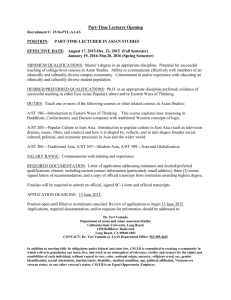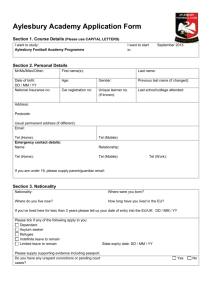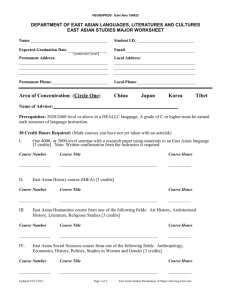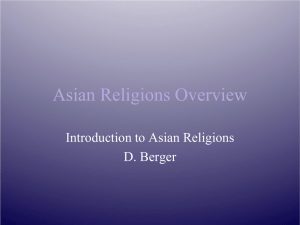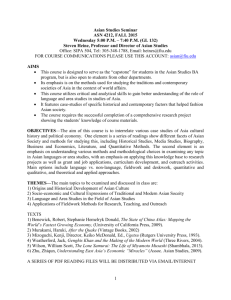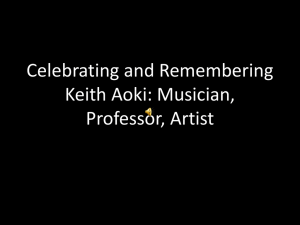On Study of Classroom Behavior Between Chinese Students and
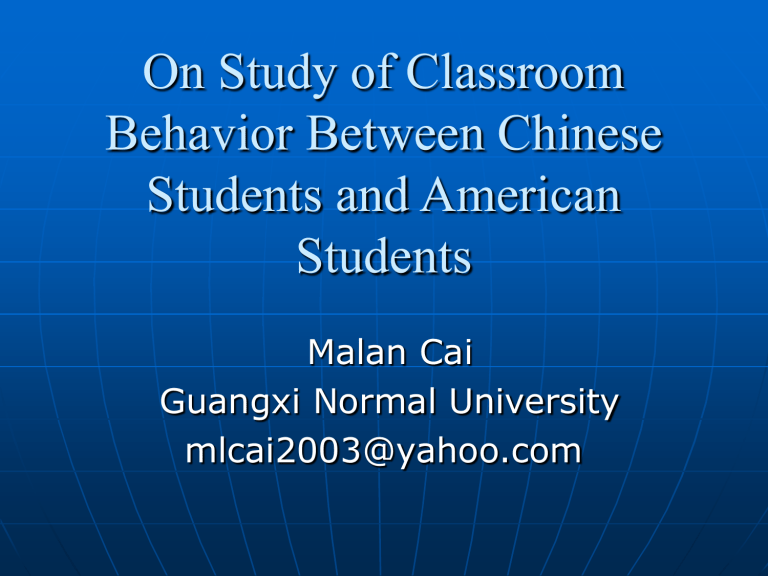
On Study of Classroom
Behavior Between Chinese
Students and American
Students
Malan Cai
Guangxi Normal University mlcai2003@yahoo.com
Introduction
Today, many American universities have experienced the trend of an ever increasing enrollment of international students. On occasion, the number of international students enrolled in a particular class can even exceed the number of American students.
Two expectations are proposed:
a. American students are more active than
Asian students in classroom participation;
b. Asian students care more how the professor and classmates receive their answers than
American students.
Method
Participants for this study are from Morehead
Sate University, 10 are American students and 10 are Asian students. Among the Asian students, 2 students are from Mainland China, one is from
Japan and 7 are from Taiwan. They are assigned to complete the questionnaire of 11 items quickly according to their first impression. Chi-square test and t-test are used to measure the data.
TABLE 1
Mean evaluation of difference between Asian students and
American students in classroom discussion.
Questions American Students
Q3. I feel comfortable speaking in the classroom discussion.
1.7
Q4. I feel nervous talking in the classroom discussion.
Q5. I
’ d let other people do the talking.
Q6. I dare not ask question in class.
Q7. I like discussing problems with the professor and the students.
Q8. I have problem in expressing myself clearly in public.
Q9. Do you care how your professor and classmates think of your answer in classroom discussion?
Q10. Are you satisfied with more or less participation in classroom discussion?
3.9
3.6
4.6
2.9
3.9
4.0
4.5
4.2
2.6
4.1
Asian Students
3.6
3.3
2.7
3.5
2.7
language problem cultural diversity less experience in classroom participation communication apprehension individual behavior
1 2 3 4 5
12 6 6 5 1
2 7 3 6 7
1 5 4 10 10
5 6 12 5 2
10 5 4 4 7
Students in Guangxi Normal
University
SA A N D SD
Q3. I feel comfortable speaking in the classroom discussion.
Q4. I feel nervous talking in the classroom discussion.
Q5. I
’ d let other people do the talking.
3
3
2
15
7
9
8
6
9
4
9
6
0
5
4
Q6. I dare not ask question in class.
0 9 5 9 7
Q7. I like discussing problems with the professor and the students.
3 8 10 8 1
Q8. I have problem in expressing myself clearly in public.
2 10 11 6 1
Discussion
The findings show that there is a great difference in classroom discussion between
Asian students and American students. The first expectation is true. American students are more active than Asian students in class. They feel more comfortable speaking in class than
Asian students.
“ If we seek to understand a people, we have to put ourselves as far as we can, in that particular history and cultural background [ … ] one has to recognize that countries and people differ in their approach and their ways, in their approach to life and their ways of living and thinking.
The Asian students ’ silent response to the classroom discussion is caused by the similar educational background and educational philosophy they ’ ve received.
“Silence is gold.”
“Less speaking is the best way of speaking.”
“The superior man is diligent in duty but slow to speak.”
“Of the two persons walking with me, at least one can be my teacher. I would learn from his good points and guard against his bad ones.”
“ He who knows does not talk, he who talks does not know ”
Dewey’s educational thought
A culture transmits its values by providing its young with the kinds of experiences that make their value real and significant for their own lives.
We encourage them to follow their own purposes of communication. […] Similarly, learning to participate in democratic life involves living democratically ---students working together on common problems, establishing the rules by which their classroom will be governed, testing and evaluating ideas for the improvement of classroom life, and learning, and participating in the construction of objectives for their own learning.
Dewey believed that teacher should make students aware of various possibilities --- possibilities in the domain of ends or learning objectives and possibilities among means for achieving their ends.
Comparing the Eastern education philosophies with the Western education philosophies, we can find that they are totally different.
In order to understand them, we have to understand their way of life and approach. If we wish to convince them, we have to use their language as we can, not language in the narrow sense of the word, but the language of the mind.
”
Jawaharlal Nebru (1991)
“As we regard the host environment as a partner and engage ourselves in that environment, we need to be prepared to accept the likelihood that a part of who we are maybe changed by our new experiences, at least temporarily. This willingness to be changed is vital if we are to attain a degree of functional fitness in the new socio-cultural system…this understanding of adaptive capacity within ourselves bring hope and strength even in the midst of severe culture-shock experiences”
(Young Yun Kim, 225-226).
